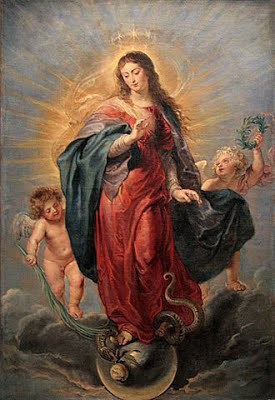The Immaculate Conception doctrine asserts that the Blessed Virgin Mary was conceived free from any trace of Original Sin, in anticipation of her role as the Mother of God, specifically the Son, Jesus Christ.
This teaching constitutes one of the four Marian dogmas upheld by the Catholic Church.
Before the formation of the world, God the Father selected the Blessed Virgin Mary to serve as the Mother of His Son, Jesus Christ.
The Archangel Gabriel conveyed the message to her, affirming that she was “full of grace” (Luke 1:29) or God’s “favored one,” underscoring her exceptional suitability to conceive the Son of God.
She was bestowed with divine gifts that befitted her crucial role. Since the inception of the Church, there has been a belief not only in the Virgin Mary’s perpetual virginity but also in her immaculate conception, signifying her exemption from Original Sin inherent in all others following the transgression of Adam and Eve.
This distinctive privilege enabled her to flawlessly fulfill her distinctive mission as the Mother of God. God the Father bestowed unparalleled blessings upon the Mother of His Son, surpassing any other created individual.
The doctrine of the Immaculate Conception affirms Mary’s exemption from original sin, while the Council of Trent, conducted from 1545 to 1563, had previously confirmed her freedom from individual or personal sin.
The celebration of the Immaculate Conception of the Blessed Virgin Mary by the Church has been observed with a feast, dating back possibly to the fifth century. In 1708, it was officially designated as a Holy Day of Obligation.
Blessed Pius IX formally declared the ancient belief on December 8, 1854, in the bull Ineffabilis Deus. In this proclamation, the Immaculate Conception of the Blessed Virgin Mary was established as a dogma of the Faith.
Pope Pius IX officially declared that, through a unique grace and privilege bestowed by Almighty God and in consideration of the merits of Jesus Christ, the savior of humanity, the most Blessed Virgin Mary was preserved entirely free from any taint of original sin from the very moment of her conception.
To affirm the official declaration, she revealed herself to Saint Bernadette at Lourdes four years later, stating, “I am the Immaculate Conception.” The Church observes December 8 as the Solemnity of the Immaculate Conception.
Because she was free from any trace or consequences of Original Sin, the Blessed Virgin Mary did not experience the disordered passions that could lead to sin, and as a result, she remained without sin throughout her entire life.
Whenever the Church asserts that all individuals have sinned, it has consistently made a point to exempt the Mother of God, who was granted this unique privilege by God in anticipation of the merits of Jesus Christ.
The development of this doctrine was a gradual process. Although many Fathers and Doctors of the Church regarded Mary as the most exceptional and holiest among the saints, they frequently struggled to perceive Mary as completely without sin, either from her conception or throughout her life.
This particular Church teaching emerged more from the devoutness of the faithful than from the theological insights of distinguished scholars.
Even notable advocates of Mary, such as St Bernard of Clairvaux and St Thomas Aquinas, found it challenging to find a theological rationale for this belief.
The celebration of the Solemnity of the Immaculate Conception is an occasion to rejoice in the extraordinary gift of Mary to humanity from God.
It also serves as a reminder to acknowledge more clearly the truth that each individual has been created by God for a specific mission that only they can fulfill.
In reflection, the words from Jeremiah 1:5-6 resonate: “The word of the Lord came to me thus: ‘Before I formed you in the womb I knew you, before you were born I dedicated you, a prophet to the nations I appointed you.'”
Today’s Immaculate Conception of the Blessed Virgin Mary Feast Day Quote:
Let us repeat frequently these words applied by the Church to the Blessed Virgin: “Thou art all fair, Mary! and there is not a spot in thee.”
Related Links
Powered By SEO Experts
Follow @ReadingCatholic

